 Destiny.
Destiny.
That is the world’s most mysterious concept.
Does destiny really exist? Is it possible for us to know it? And do our actions even matter at all?
Numerous books, movies, and songs have explored those questions.
People like having control of their lives, so the idea of a predetermined fate is met with anger and frustration…but also, interest.
This interest unfortunately supports astrology, fortune-telling, and other occult activities. But the question today is, what does the Bible say?
Does the Bible mention destiny at all? And if it does, how does destiny affect salvation?
Those are both excellent questions, but before we answer them, let’s lay some groundwork first.
Understanding God’s Sovereignty
 The Bible often tells an important fact about God: He is sovereign.
The Bible often tells an important fact about God: He is sovereign.
But what exactly does that mean?
It means that as Creator of the universe, God has the right to rule His creation and influence it to achieve His purpose.
God is the highest authority who acts however He pleases, whenever He pleases (Ps. 135:6, Ps. 115:3). And He is not subject to anyone’s will or desires (Dan. 4:35).
Scripture describes God’s sovereignty over many domains such as the following:
- Creation as a whole (Ps. 24:1, Ps. 103:19, Ps. 83:18)
- Nations of the earth (Dan. 2:21, Prov. 21:1, Ps. 47:8), and
- Individual people (Prov. 19:21, Prov. 16:9, Prov. 21:30)
God not only has the right to rule over creation, but He also has the wisdom and power to affect it.
He says in Isaiah for example:
I make known the end from the beginning, from ancient times, what is still to come. I say, ‘My purpose will stand, and I will do all that I please.’ (Is. 46:10 NIV)
And later…
I declared the former things long ago and they went forth from My mouth, and I proclaimed them. Suddenly I acted, and they came to pass. (Is. 48:3 NASB)
These verses give us a glimpse of how God’s hand is on all of history. He didn’t simply make the world and leave it to handle itself. He’s already determined the course of history and He acts to make His plan come to pass.
This means everything that happens in life is either influenced by or allowed by God.
“But wait, doesn’t that mean God is the source of evil?”
No, not at all.
No evil dwells in God (Ps. 5:4) and there is no darkness in Him (1 John 1:5). Evil is against His very nature, so it’s impossible for Him to do it.
(Note: Some verses like Job 2:10 and Isaiah 45:7 do describe God as a source of “evil” in some translations. The context of these verses, however, show that “calamity” or “adversity” is described. These can both be used to show God’s justice or discipline, and they are not morally evil.)
James also wrote that “God cannot be tempted by evil, nor does He Himself tempt anyone. But each one is tempted when he is drawn away by his own desires and enticed” (James 1:13-14). So if we want to know the source of most evil, we just need to look in the mirror (Mark 7:21-22).
The great thing about God though, is that He takes humanity’s evil, and uses even that for good (Rom. 8:28 NASB).
A few examples of this would be in the stories of Joseph (Gen. 50:20) and Daniel (Dan. 6:26-27), but the biggest one is the sacrificial death of Jesus Himself (Acts 2:23, 1 Cor. 2:8 ESV).
Sometimes God works in obvious ways to bring good results. Other times, He sits back and allows events within His bounds. It’s important to know that He’s always in control though—even when we don’t understand His actions (Rom. 11:33).
God’s “foolishness” is greater than our wisdom (1 Cor. 1:25), and we know that He’s just, upright, and faithful (Deut. 32:4). So there comes a time when you just have to trust Him (Ps. 46:10, Prov. 3:5-6).
God’s sovereignty is one of the most awe-inspiring traits about Him. And this becomes more evident when we discuss salvation.
Salvation Explained
 Before we get to the main point, we need to define salvation.
Before we get to the main point, we need to define salvation.
Christians everywhere talk about being saved, but why do you need to be saved? And what exactly are you being saved from?
The best way to answer these questions is to use a courtroom analogy.
The Bible describes God as Judge over all creation (Ps. 50:6), so He’s the judge in this scenario. And unfortunately for you and me, we are both guilty defendants facing a death sentence.
Why is that you ask?
It’s because all of humanity has one big problem: sin.
Defining Sin
Sin is any form of rebellion against God and any action that falls short of His character (1 John 3:4).
Our Judge can only accept perfection, but we are all tainted by three types of sin:
- Imputed sin
- Inherited sin
- Personal sin
Imputed sin, as I’ll refer to it here, is the guilt credited to us due to Adam’s choice in the Garden of Eden. (When I say “guilt” by the way, I still mean in a legal sense, not the emotional kind.)
As the first male in human history, the Bible describes Adam as a representative for humanity. Scripture views the human race as a unit, and since this unit came from Adam, his sin doomed us all (Rom. 5:12, Rom. 5:14).
Now some may claim this is unfair since none of us ate the fruit, but again, we were all represented by Adam.
A common way to explain this is to use the president-nation example. If the president of the US declared war on a foreign country, then all of America would be at war. This would include everyone from the president to a farmer in Nebraska—even though the latter didn’t make that choice.
When Adam sinned, he declared war, or rebellion, against God. And as our representative, he dragged us all into a fight we never chose.
Inherited sin is what I call “the sin nature”.
Before Adam’s sin in the garden, God told him that He would die if he ate the fruit (Gen. 2:17), but Adam actually lived many years afterwards.
So did God lie to Adam?
Of course not.
Adam did die that day. He died a spiritual death.
Adam’s sinless nature was corrupted and his relationship with God was broken.
This moral corruption is handed down to all of Adam’s descendants too. That means every human is born spiritually dead and has an inclination to sin (Jer. 17:9 NASB, Ps. 51:5, Eph. 2:1 NIV).
The immoral acts we commit do not make us sinners. Rather, our sinful nature makes us do those acts (John 8:34 ESV).
Now this doesn’t mean people can’t do good from a human perspective. Nor does it mean every person is as evil as he or she could be. But like a glass of water with one drop of poison, this corruption makes us all unacceptable (Is. 64:6).
Personal sin is the most tangible of the three.
These are immoral acts and attitudes we know all too well (Gal. 5:19-21).
Stealing, lying, murder, selfishness, pride, racism, jealousy, abuse, etc. These aren’t just wrongs against other people; they’re crimes against our Creator. And even if you object to the other forms of sin here, no one can deny that they have sinned personally (Ecc. 7:20, 1 John 1:8).
The Second Adam
 Now that we know why we’re guilty, we need to understand the punishment.
Now that we know why we’re guilty, we need to understand the punishment.
I mentioned a death sentence earlier because “the wages of sin is death” (Rom. 6:23). And the ultimate death in this case is separation from God’s goodness into conscious, eternal suffering (2 Thess. 1:9).
You’ll often hear people ask, “Why would a loving God punish you eternally for lying?” But people who ask questions like this don’t understand the fullness of sin or the nature of God.
For one, I just showed how everyone is guilty of much more than one personal sin. But second, God has more attributes than just love.
Contrary to most modern teaching, God is also just, He is also righteous, He is also holy. And He cannot accept anything less than His nature—that is, perfection.
But since this is the case, how can anyone be saved from God’s wrath?
That’s where Jesus comes in (John 3:16-17, Rom. 5:8-9 NIV).
Jesus is God in the flesh who was born of God’s Spirit through a virgin. Because of this miraculous birth, Jesus became the only sinless Man in history.
Neither imputed or inherited sin came to Jesus because He wasn’t born of Adam (i.e. from a human father). And Jesus’ divine nature kept Him from committing personal sin (1 Pet. 2:22).
Now what does all this have to do with salvation?
It means Jesus was the only One who could take God’s punishment on our behalf (Heb. 2:17 ESV).
His sinless nature let Him meet God’s perfect requirement, and His humanity let’s Him represent all who believe (1 Cor. 15:22).
This is why Scripture calls Jesus “the second Adam” (1 Cor. 15:45, 1 Cor. 15:47). Trust in Him affects all the sin the original brought upon us:
Imputed sin. Remember how Adam’s choice was like a president dragging a country to war? Well trusting in Christ is like defecting to another nation—or Kingdom (see Col 1:13 NLT). Jesus is a Representative who paid the debt for sin and is an ally of God. So those who trust in Him are credited with His righteousness and are not legally guilty (Rom. 5:19, Rom. 8:1, 2 Cor. 5:21).
Inherited sin. Faith in Christ also addresses the moral corruption we received from Adam. Yes, believers still keep their sin nature, but they gain both the will and the strength to live as a new creation (Rom. 6:6-7, 2 Cor. 5:17).
Personal sin. Since believers are no longer slaves to sin, the number of personal sins they commit is reduced (Heb. 9:14). The new nature Christians have won’t let them live sinful lifestyles (1 John 3:9 ESV). And as believers mature, their personal sins lessen even more.
So that’s the salvation Jesus provides. Those who trust in Him are saved from sin’s punishment and from the power of sin itself.
But since the problem of sin is universal, and since the benefits of faith are so great, why doesn’t everyone believe?
That is the question tying everything together. So this is what I’ll cover next.
God’s Sovereignty in Salvation
 Going back to my previous cliffhanger, why doesn’t everyone put faith in Christ?
Going back to my previous cliffhanger, why doesn’t everyone put faith in Christ?
The answer is simple: They don’t want to.
“But why don’t they want to? We’re all sinners in need of saving. This isn’t a choice to visit the store or the DMV. We’re talking eternity here!”
Yes, you are right. The stakes are extremely high. But the main reason they don’t want to isn’t because they don’t know the stakes…
The reason they don’t want to is because they are sinners.
Let me explain.
Remember the inherited sin I mentioned earlier? Well this is what the Bible says about people with a sin nature:
As it is written:
“There is none righteous, no, not one; There is none who understands;
There is none who seeks after God. They have all turned aside;
They have together become unprofitable;
There is none who does good, no, not one.” (Rom. 3:10-12)
But wait, surely this isn’t right? If everyone is born in sin, and sinners don’t seek God, then how can anyone be a Christian?
We, like the disciples, ask, “Who then can be saved?”
Fortunately, Jesus answered this very question:
Jesus looked at them and said, “With man this is impossible, but with God all things are possible.” (Matt. 19:25-26 NIV)
The truth is that people don’t choose God on their own—sin makes it impossible for us to do so (Rom. 8:7 ESV).
That’s why God had to choose us first.
This choice is what the Bible calls “election”. It’s a doctrine that describes God’s sovereignty in salvation, and the following chart will help me explain it:
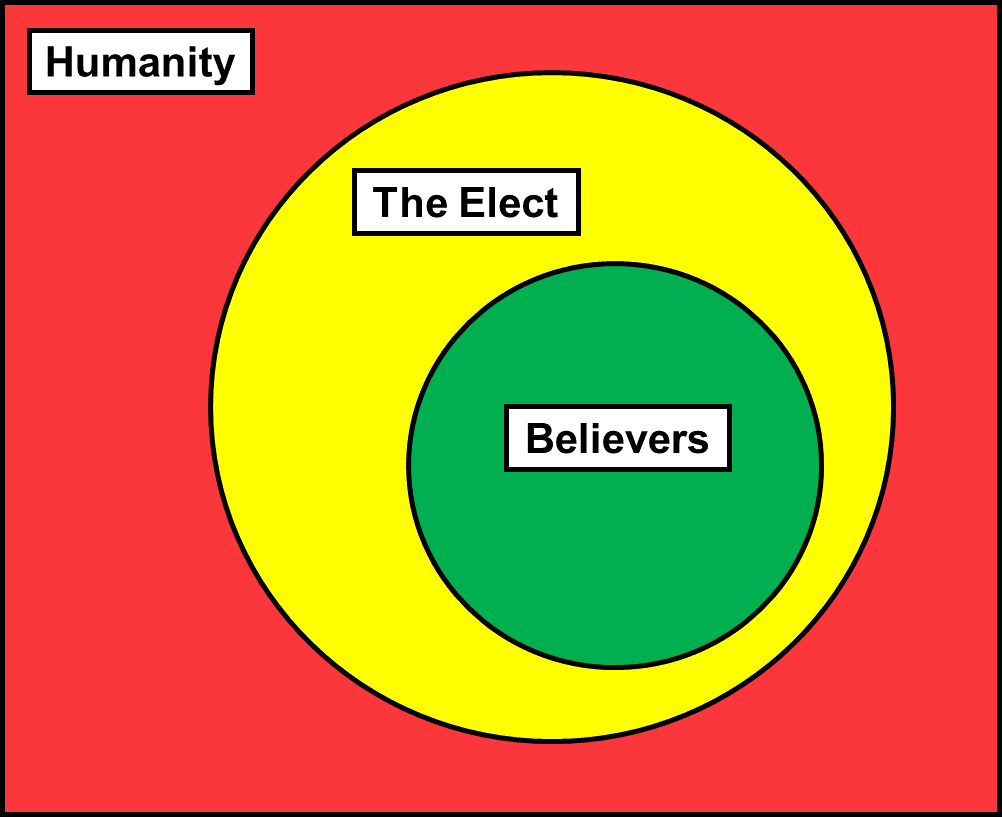
The red box here includes all of humanity, the yellow circle represents the elect, and the green circle depicts believers.
Note how each smaller section is included in the bigger ones too. This shows that each smaller section shares traits with the bigger ones it’s included in.
For example, every believer is one of the elect and also a member of humanity. Or to give another example, all the elect are members of humanity, but not all the elect are currently believers.
So now that you know how to read this chart, let’s take a look at each individual section.
Humanity
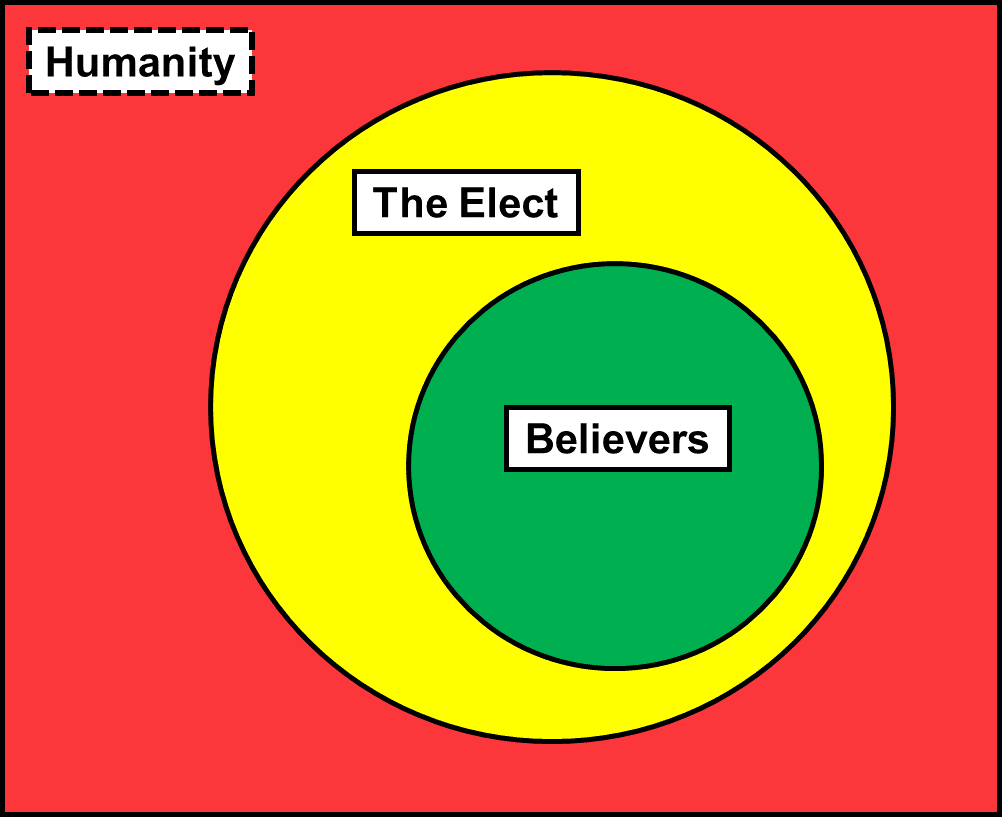
The humanity section represents people who are born in sin. So yes, that includes everyone.
These people were born spiritually dead and do not seek God on their own (John 6:44).
I won’t spend much time here since I explained the state of humanity earlier. So let’s move on.
The Elect
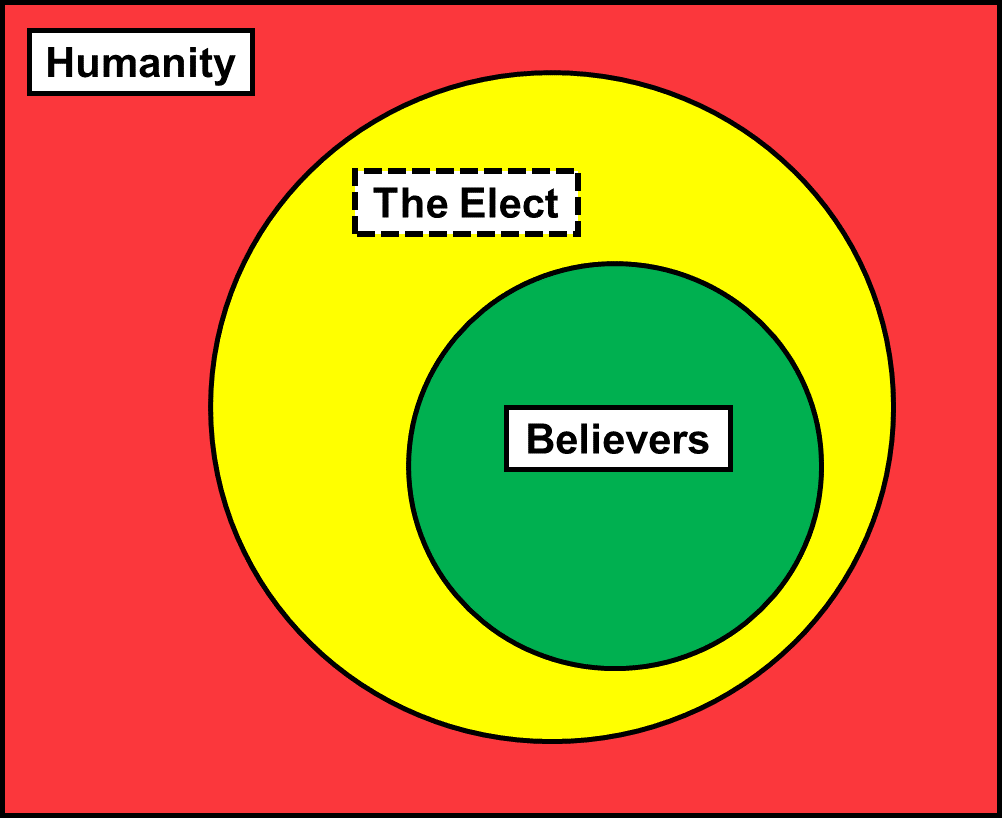
Next, we have the elect.
These are all members of humanity God chose in eternity past to be saved.
Yes, this sounds puzzling at first, but Scripture clearly teaches it in passages like the following:
For those whom [God] foreknew, He also predestined to become
conformed to the image of His Son, so that He would be the firstborn
among many brethren (Rom 8:29 NASB, emphasis added)
The Book of Romans tells us that God “foreknew” people and “predestined” them to become Christians.
Now some people misinterpret this to say that God foresaw people’s faith, but this is a false teaching. The verse says nothing about people’s actions. It says “those whom [God] foreknew”.
People are the object of God’s foreknowledge. But now we ask, what does the verse mean when it says “foreknew”?
Well, the sense here isn’t just seeing into the future. Rather, the word “knew” or “know” in the Bible often indicates a special relationship.
We see an example of this when God tells the prophet Jeremiah, “Before I formed you in the womb I knew you, before you were born I set you apart” (Jer. 1:5 NIV). Jesus gave another example as He says to false followers, “I never knew you” (Matt. 7:23).
Simple knowledge isn’t being described in these verses. Besides, Jesus and God the Father are both omniscient, which means they know everything (1 John 3:20, Matt. 9:4).
These verses are more about the relationship between speaker and hearer.
So going back to Romans 8:29, Paul is saying that God—in eternity past—chose people for a relationship and predestined them to be like Christ.
Ephesians also presents the same idea in its introduction:
He chose us in Him before the foundation of the world, that we should be holy and without blame before Him in love, having predestined us to adoption as sons by Jesus Christ to Himself, according to the good pleasure of His will (Eph. 1:4-5 NASB)
Here we see that God chose people “before the foundation of the world” and “predestined” them to be saved “according to the good pleasure of His will”.
God, in His sovereignty and infinite wisdom, has already chosen everyone who will be saved, and He predestined their salvation. This is why Jesus said, “All that the Father gives Me will come to Me” (John 6:37) and “you do not believe because you are not my sheep” (John 10:26).
The elect are all people chosen by God who will eventually believe if they don’t already.
Believers
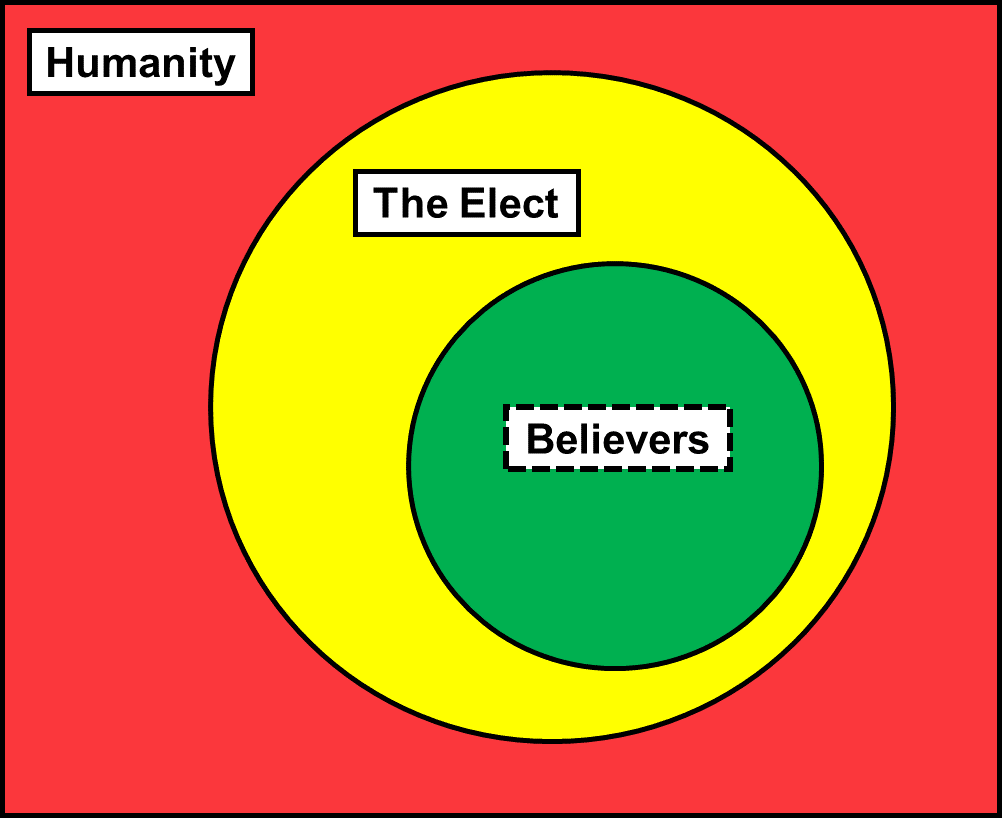
The last section of our chart represents believers.
These are members of humanity who were elected by God and later came to saving faith in Jesus. So in other words, these people are true Christians.
The Christian’s status as one of the elect is why Luke used the following language:
Now when the Gentiles heard this, they were glad and glorified the word of the Lord. And as many as had been appointed to eternal life believed. (Acts 13:48)
Notice how Luke doesn’t say anything about the intelligence or faith of believers here. Instead he writes “as many as had been appointed to eternal life believed.”
The ultimate reason why anyone believes the gospel is because they were chosen by God. The predestination we mentioned earlier is just coming to fruition.
This is why Paul writes to Timothy saying, “[God] has saved us and called us to a holy life—not because of anything we have done but because of his own purpose and grace. This grace was given us in Christ Jesus before the beginning of time” (2 Tim 1:9 NIV).
God did not choose believers because He foresaw their faith or intelligence or the great things they’d accomplish. Rather, He saved us because that’s what He decided to do (1 John 4:19 NIV).
The End Result
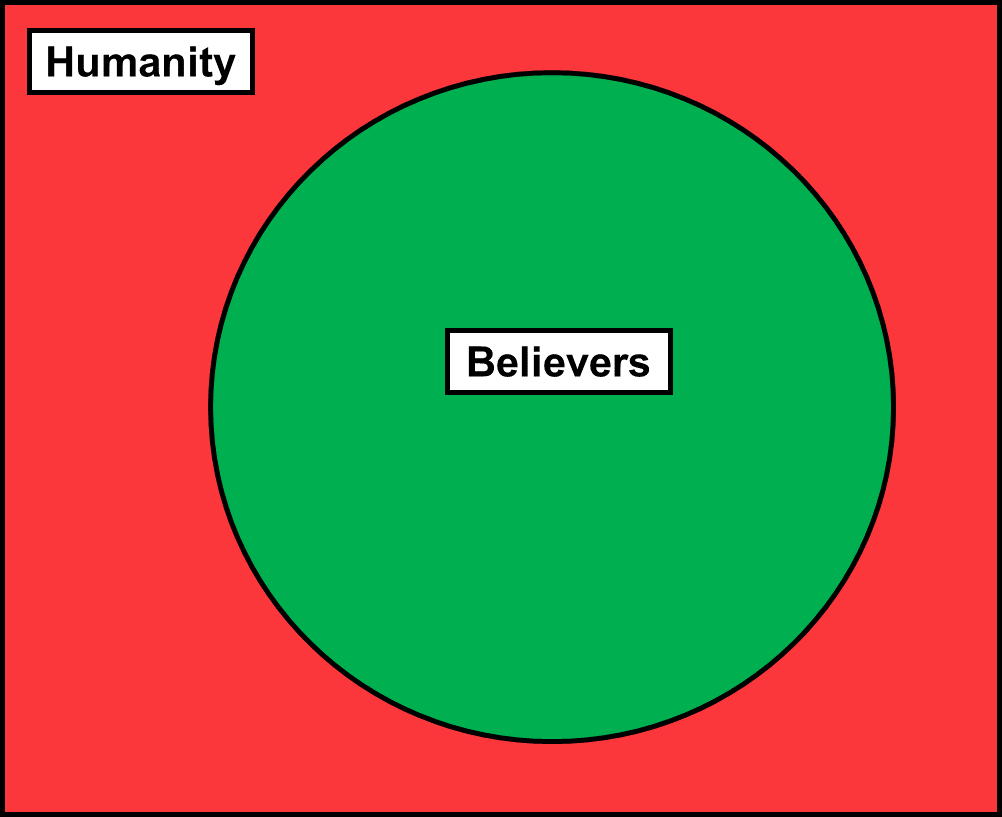
Finally, this chart shows the end result of election.
Jesus said “All that the Father gives Me will come to Me” (John 6:37), and this chart illustrates that fact.
Note how the Believers section only expanded to include The Elect though. The people who weren’t chosen are still in red. And this is how humanity will look at the very end (see Matt. 13:47-50).
Common Objections to Election
Next, we’ll address a few objections to election.
I admit that this is a difficult doctrine to accept, and because of that, you see a lot of similar questions. But hopefully my answers here will help.
Objection 1: It’s Unfair
The most common objection to this doctrine is that it’s unfair.
Why does God save some and not others? He must be evil to do something like that.
But Paul, inspired by the Holy Spirit, addresses this very complaint:
What shall we say then? Is there unrighteousness with God? Certainly not! For He says to Moses, “I will have mercy on whomever I will have mercy, and I will have compassion on whomever I will have compassion.” So then it is not of him who wills, nor of him who runs, but of God who shows mercy. (Rom. 9:14-16)
Paul’s defense here is God’s sovereignty. As Creator of the universe, God has the right to choose whom He shows mercy.
That may not be the answer we want to hear, but we have to remember that we are all guilty before God. And because of our guilt, it would be perfectly just to save no one.
Yes, I know that’s a tough pill to swallow, but all prisoners can’t demand release if some are pardoned. And beggars everywhere can’t claim your money if you give change to a few.
God “has mercy on whom He wills” (Rom. 9:18), and sometimes, we have to leave it at that.

But another answer is that God has a purpose for the saved and the unsaved—with the latter often serving it unknowingly.
Paul explains this using God’s words to the pharaoh who kept ancient Israel enslaved:
For the Scripture says to the Pharaoh, “For this very purpose I have raised you up, that I may show My power in you, and that My name may be declared in all the earth.” (Rom. 9:17)
And later, he writes:
What if God, wanting to show His wrath and to make His power known, endured with much longsuffering the vessels of wrath prepared for destruction, and that He might make known the riches of His glory on the vessels of mercy, which He had prepared beforehand for glory (Rom. 9:22-23)
God’s choice may seem unfair to us, but one, He has the right to make it; and two, it brings Him glory.
Punishment of the guilty shows his justice, while salvation of the unworthy shows His mercy.
Objection 2: The Non-Elect Don’t Have a Choice
This is another objection Paul addressed:
You will say to me then, “Why does He still find fault? For who can resist His will?” (Rom. 9:19 ESV)
These questions basically ask, “Why does God still hold me accountable if my destiny is already decided?”
Instead of giving a grand philosophical answer though, Paul once again refers to God’s sovereignty:
But indeed, O man, who are you to reply against God? Will the thing formed say to him who formed it, “Why have you made me like this?” (Rom. 9:20)
Again, we are all born guilty and deserving of God’s punishment—that’s the sad reality sin brought on the human race. Our status as sinners doesn’t mean we don’t have a choice though, so we can’t get mad at God (Prov. 19:3 NASB).
We’re still given free will to make choices. Our “free” will is just bound by sin.
Inherited sin affects us so deeply that we won’t naturally choose God (see Rom. 8:7).

When people first learn about election, they falsely imagine the non-elect begging God to let them believe, but that never occurs in practice. The non-elect dismiss this all as foolishness and go act according to their nature (1 Cor. 2:14, 1 Cor. 1:18).
You might say they didn’t have a real choice since it was affected by other factors, but isn’t that the case with every choice you make?
You go to the crowded restaurant downtown even though you have plenty of food at home. Why? Because it’s what you want.
Students pay out-of-state tuition to attend their dream school when there’s a perfectly good college in town. Why? Because it’s what they want.
We make irrational choices all the time because of our desires. That doesn’t mean they aren’t real choices.
Objection 3: This Means a “Loving” God Willingly Sends People to Hell
We addressed this objection earlier, but after people learn about election, they may say something like this:
“Oh, so not only does God send people to hell, but He also willingly chooses who goes there…”
But we have to understand what’s really happening.
For one, punishing people for their sin is not morally wrong. No one calls a judge corrupt for sending criminals to prison, but that’s exactly what people do with God.
And second, God is more merciful than any human judge.
Like I said earlier, it would be perfectly just to not save anyone because we’re all guilty. But God, in His loving mercy, sent Jesus to take the punishment on our behalf. And He pardons anyone who trusts in Jesus’ work (1 John 4:10).
No human judge offers a pardon to every criminal facing a death sentence. That is unheard of.
Or better yet, think of it this way. If a father gave his son a Honda Accord for his 16th birthday, but the son refused because he wanted a Ferrari, does that mean the father isn’t loving?
What Jesus provides is worth far more than any Honda Accord or Ferrari, yet people still deny Him because reality doesn’t align with their desires.

The Bible also repeatedly says that God does not want to punish people (Ezek. 18:23, Ezek. 18:32, Ezek. 33:11, Lam. 3:33, Is. 55:7, 2 Pet. 3:9, 1 Tim. 2:3-4). His justice just demands that He does (Ps. 9:8).
The truth is, God doesn’t have to choose people for hell; that is the default path everyone is on (John 3:18). The fact that God must intervene for anyone to trust in Christ proves that we are choosing hell ourselves.
Why Spreading the Gospel is Always 100% Effective (And 3 More Benefits of Election)
Now that we know what election is and we’ve addressed some common objections, how does this knowledge actually help?
Good question.
I’ll explain four key benefits here.
Benefit 1: We Gain Confidence in Spreading the Gospel
This one might sound counter-intuitive, but we gain confidence in evangelism.
A lot of people learn this doctrine and think there’s no point in teaching since destiny is already decided. But that’s the wrong attitude to have.
Think about this way: If a friend asked you to go fishing one weekend, you could easily turn him down. Besides, those fish will always be there, and someone else will catch them sooner or later.
But what if he guaranteed that you’d catch 20 fish? No matter what happened that day, those 20 would be yours if you decided to go.
You’d be more inclined to accept if that were true. You wouldn’t worry about the hundreds of fish that got away. You’d just know that you were promised 20, and you’d focus all your efforts on them.
This is the mindset you need as a “fisher of men” (Matt. 4:19).

Paul shared a similar attitude when he wrote, “I endure all things for the sake of the elect, that they also may obtain the salvation which is in Christ Jesus with eternal glory” (2 Tim. 2:10).
Jesus touched on this too in His parable of the sower (Matt. 13:3-9). In that parable, a person sows seed on all types of soil, but only the seed that fell on good ground produced a crop (Matt. 13:8). The sower is a person who spreads the gospel, and the good soil represents those who believe—a.k.a. the elect (Matt. 13:23).
The biblical response to election isn’t to sit back as destiny works, but rather, to take an active role in making destiny come to pass.
Paul encouraged this action when he wrote:
How then shall they call on Him in whom they have not believed? And how shall they believe in Him of whom they have not heard? And how shall they hear without a preacher? And how shall they preach unless they are sent? (Rom. 10:14-15)
Yes, the elect are destined to believe, but “faith comes from hearing, and hearing through the word of Christ” (Rom. 10:17 ESV).
When we spread the message about Jesus, we allow God to use us as instruments of His will (2 Cor. 5:20 ESV). And since people’s belief is proof that God chose them (1 Thess. 1:4-5 ESV), this work is always 100% effective.
Benefit 2: We Understand What Happens in the Field
So I just mentioned that people’s belief is evidence of God’s election. And this fact gives us a glimpse of what really happens in the field.
Most people think faith in Christ is the beginning of salvation, but this step is only the first that’s evident to us.
The Book of Romans defines the whole process in the following verses:
For whom He foreknew, He also predestined to be conformed to the image of His Son, that He might be the firstborn among many brethren. Moreover whom He predestined, these He also called; whom He called, these He also justified; and whom He justified, these He also glorified. (Rom 8:29-30)
From this passage, we see that the process looks like this:
- God elects people according to His will
- He predestines their salvation
- He calls them through the gospel
- He justifies (or declares them righteous) through faith, and…
- He glorifies (or gives a sinless body to) believers
Steps 3 and 4 are the ones we experience now, so we need to know what happens there. Fortunately, the groundwork we’ve laid should give you an idea.
Remember when I asked why everyone doesn’t believe in Christ? The answer to that question was sin. People have a sin nature because they are born spiritually dead.
But now the question is, “Why does anyone believe at all?”
We partially answered that by showing how God chooses people to be saved. But that answer doesn’t address the sin problem. God’s election just means He chose a dead man.
Something else has to happen for the elect to believe. And this something is called “regeneration”—a.k.a. being born again (John 3:3).
Most people equate being born again to the act of trusting in Christ, but the two events aren’t the same. I know I’m guilty of lumping the two together, but the truth is, God gives spiritual life right before people become Christians.
A good comparison here is when Jesus raised Lazarus from the dead (John 11:43-44).
Jesus told Lazarus to come forth. Then Lazarus responded and came out the grave.
But how could a dead man respond at all?
Because Jesus made him alive.
A similar process happens when we spread the gospel:
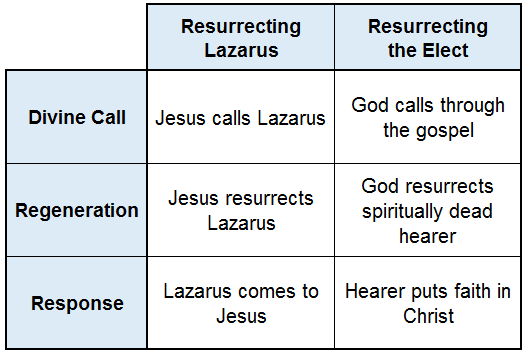
If the hearer is one of the elect, God will call through the message and resurrect their spirit so the hearer believes (2 Thess. 2:13-14 ESV, 1 Pet. 1:23 ESV).
From our perspective, it looks like the person just made a choice. But this choice is a result of God’s work inside the hearer (John 3:8; also see Acts 16:14 NIV, 1 John 5:1).
This is why John said Christians “were born, not of blood, nor of the will of the flesh, nor of the will of man, but of God” (John 1:13).
A literal miracle occurs every time someone puts faith in Christ.
God raises a person to spiritual life each time. And numerous verses attest to this fact (Eph. 2:4-5, Col. 2:13, James 1:18 NIV, Titus 3:5).
Benefit 3: It Keeps Us Biblically Sound
God’s sovereignty in salvation demands that we stay biblically sound.
I just showed how God uses the gospel to call the elect, but if we don’t present that message accurately, our words will be powerless.
We have to remember that “the word of God is living and active” (Heb. 4:12 ESV). The Bible isn’t simply a Book written by men; all of it’s words are “God-breathed” (2 Tim. 3:16 NIV; also see 2 Pet. 1:20-21).
God spoke of His own word’s power in Isaiah saying:
“For as the rain and the snow come down from heaven,
And do not return there without watering the earth
And making it bear and sprout,
And furnishing seed to the sower and bread to the eater;
So will My word be which goes forth from My mouth;
It will not return to Me empty,
Without accomplishing what I desire,
And without succeeding in the matter for which I sent it. (Is. 55:10-11 NASB)
People don’t come alive through therapy, mindfulness, or any other man-made technique. They come alive when they’re summoned by the King (2 Cor. 4:6 ESV).
We have to stay faithful to the text if we want real results. We can’t make allegories out of the Bible or read ourselves into its stories. We have to explain it in context and apply the meaning to people’s lives.
Many “pastors” think they’re clever when they elevate their ideas instead of the text, but this only sabotages their audience. When we get away from sin, judgment, and Jesus, we hinder the Spirit’s work of conviction in people’s hearts (John 16:8).
We can’t just teach parts of the Bible that sound good—peace, love, and blessing every week doesn’t convict. In fact, the people who do this are the ones Scripture says to avoid (2 Tim. 3:5 NIV).
It should be our goal to echo David’s words instead:
I have not hidden Your righteousness within my heart;
I have declared Your faithfulness and Your salvation;
I have not concealed Your lovingkindness and Your truth
From the great assembly. (Psalm 40:10)
Benefit 4: It Humbles Us Before God

Finally, the truth of God’s election should humble us.
Some people become arrogant once they learn about this doctrine, but Scripture soundly refutes our pride.
Going back to Paul’s election discussion, he shows how God chose Jacob — who was later renamed Israel — instead of his older brother, Esau, for blessing. And this choice occurred before either of them were born (Rom. 9:10-12).
Jacob was chosen before he or Esau had done anything right or wrong. So the choice there was based solely on God’s will.
This same reason is why belief isn’t cause for pride. The only reason people believe is because God granted them mercy.
Ephesians says it is “by grace you have been saved through faith. And this is not your own doing; it is the gift of God, not a result of works, so that no one may boast” (Eph. 2:8-9 ESV).
If the Christian’s choice was the ultimate reason they were saved, there would be reason to boast. But as the verse says, this isn’t the case.
That’s why we should question ourselves saying, “What do you have that you did not receive? And if you did receive it, why do you boast as though you did not?” (1 Cor. 4:7 NIV).
Again, God did not choose people based on their worthiness. He chose according to His will. And when you realize that God saved you because He decided to, the only proper response is humility.
Destiny’s Calling

For many are called, but few are chosen. (Matt. 22:14)
Wow, this went on much longer than expected.
My goal was to be as thorough as possible though. So hopefully this was worthwhile.
The topic I presented here is complex, and many Christians still debate the details of election, but this post shows the view that seems to align best with Scripture.
Please remember that salvation itself is more important though, so let’s not argue over matters like this. Election is biblical but it’s not our job to worry about all the details…
Scripture focuses more on Jesus as the only salvation there is (Acts 4:12 NIV).
So if you haven’t already, please do yourself a favor, and answer destiny’s call.
-Drew
Photo Credits (By Order of Appearance):
- Rodrigo Rodriguez on Unsplash
- Aaron Burden on Unsplash
- QuinceCreative on Pixabay
- Christoph Schmid on Unsplash
- Chris Flexen on Unsplash
- Swapnll Dwivedi on Unsplash
- Vladislav Babienko on Unsplash
- Aaron Burden on Unsplash
- Diana Vargas on Unsplash
- Aaron Burden on Unsplash
- Tim Mossholder on Unsplash
Leave a Reply